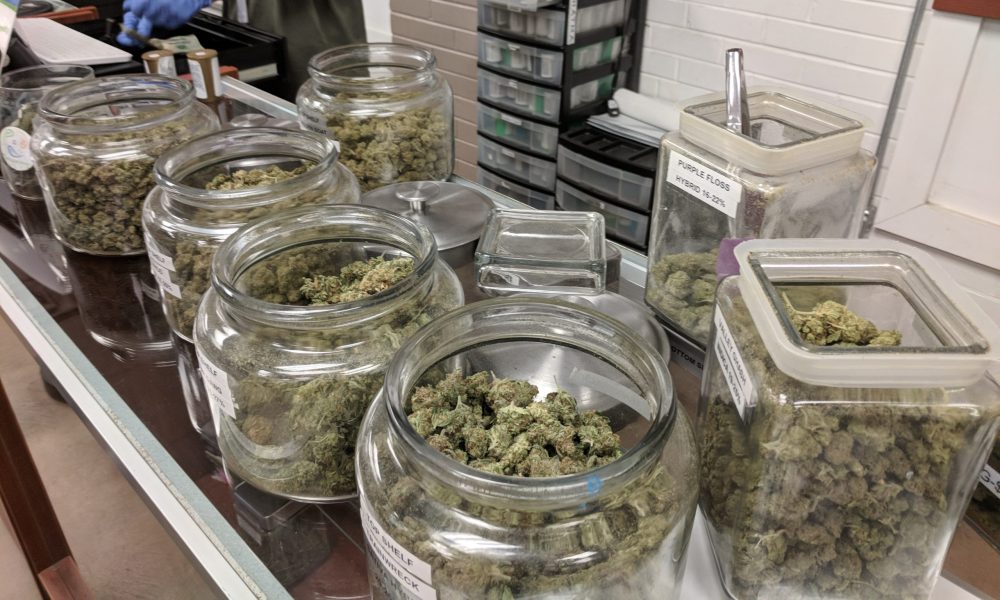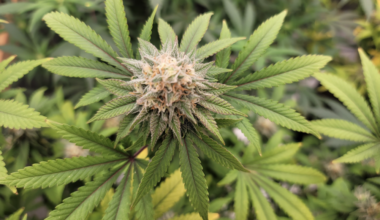A three-judge panel of the U.S. Court of Appeals for the Ninth Circuit has rejected a lawsuit by cancer patients and their doctor seeking access to psilocybin—the main psychoactive compound in psychedelic mushrooms—to help treat end-of-life depression and anxiety.
The patients and Seattle-based palliative care physician Dr. Sunil Aggarwal sued the U.S. Drug Enforcement Administration (DEA) in March, after the agency sent a letter saying there was no way for his clinic, the Advanced Integrative Medical Sciences (AIMS) Institute, to dispense a synthetic form of the psilocybin under state and federal right-to-try (RTT) laws. The laws allow patients with terminal conditions to try investigational medications that have not been approved for general use.
In a published opinion filed Monday, the Ninth Circuit panel dismissed the suit on procedural grounds, writing that the court lacked jurisdiction because DEA’s letter was not a reviewable decision.
“In short,” the opinion says, “AIMS’s issue is not with the DEA’s letter, but with the CSA’s criminalization of psilocybin use, subject to narrow exemptions. An advice letter recognizing that Congress has not yet made an exception to the CSA to allow for the legal use of psilocybin for therapeutic purposes is not an agency decision.”
Lawyers for the patients had argued that DEA’s guidance effectively left patients with no path forward — a position that DEA’s own attorney seemed to agree with.
“As the agency indicated in its letter,” Thomas Pulham, a Department of Justice Appellate lawyer, told the panel at oral argument in September, “there’s no procedure available under the Right to Try Act, because the Right to Try Act does not provide the agency any authority to waive the requirements of the Controlled Substances Act.”
Pulham argued that if the AIMS Institute and its patients were to proceed with psilocybin therapy and face enforcement action by the DEA, they could raise their right-to-try arguments at that point.
Attorney Kathryn Tucker, who represents plaintiffs in the case, told Marijuana Moment in a statement Monday that the team will continue to push for access under right-to-try laws through other means.
They next intend to file both a petition for rescheduling and a waiver request—paperwork designed to force the DEA to issue a decision that Tucker said will more clearly constitute a final agency action, “so that the merits can be reached in judicial review if necessary.”
The arguments on the merits themselves are strong, she argued: “DEA must accommodate duly enacted state and federal Right-to-Try laws, as mandated by the Controlled Substances Act. The Petition for Rescheduling offers DEA an alternative and equally compelling way to create a pathway so that terminally ill patients can access to psilocybin. Time is of the essence.”
Last spring, a bipartisan group of attorneys general from eight U.S. states and the District of Columbia sided with the cancer patients in an amicus brief, noting the therapeutic potential of not only psilocybin but also also currently illegal drugs such as MDMA.
“Here, dying patients seek access to promising new treatments still in the investigative process—access expressly permitted under both state and federal law—to help them live in peace,” the top state officials wrote.
The challenge also drew supportive amicus briefs from both the American Civil Liberties Union and the conservative Cato and Goldwater institutes.
Last month, a bipartisan group of members of Congress sent a letter urging DEA to let terminally ill patients have access to psilocybin.
At September’s oral arguments, Washington State Deputy Solicitor General Peter B. Gonick appeared alongside attorneys for the plaintiffs to argue that psilocybin fit the criteria for use under right-to-try laws.
“It is entirely consistent with the purpose and language of the state and federal right-to-try laws to include any controlled substances that have completed Phase 1 trials, including Schedule I controlled substances,” he told the panel. “It’s entirely inconsistent with the right-to-try laws to prevent patient access to these treatments.”
Congress and more than 40 states have the laws. In Washington, lawmakers passed a law unanimously in 2017 allowing terminally ill patients access to treatments that have passed Phase 1 of the U.S. Food and Drug Administration (FDA)’s approval process.
“The average time, Phase 1 to FDA approval, is seven to 10 years,” Gonick told judges. “Congress and 41 states determined that was just too long for some patients suffering life-threatening illnesses.”
While judges expressed skepticism during the arguments of DEA’s stance that the federal Right to Try Act and state laws offered no path forward for patients, they were also quick to indicate their wariness to review the case at all.
Less than 10 seconds after arguments began, Judge Ryan D. Nelson suggested that the court’s lack of jurisdiction was “the beginning and the end of the case.”
“They wrote, seeking instructions on how to proceed,” he said of the AIMS Institute’s request for DEA guidance on regarding right-to-try laws. “So if they sought instructions, how can a response for instructions ever be a final order?”
In effect, that was the same conclusion the panel reached in Monday’s opinion. DEA’s letter, the opinion says, “did no more than point to the plain language of existing law.”
In a footnote in the ruling, the court noted that advocates “have recognized that a legislative approach is necessary” to expand access to psilocybin, pointing to Oregon voters’ passage in 2020 of a measure legalizing therapeutic use and adding that “several cities have made the enforcement of psilocybin use low priority.”
As evidenced by state-level cannabis reform, however—and indeed by Washington’s own right-to-try law—such policies may be insufficient to overcome the barriers of federal prohibition. Neither state-level marijuana legalization nor right-to-try laws undo Schedule I restrictions under the CSA. That’s led clinicians like Aggarwal and others in a difficult spot.
“Given that the interests of terminally ill patients are at stake, where the advance of illness makes time short, there is an urgency for DEA’s action,” attorney Tucker said in Monday’s statement. “We hope congressional interest in this matter will continue, and possibly include Congressional Oversight Hearings.”
Meanwhile in Washington, state lawmakers are set to take up a bill in committee this week that would legalize what the legislation calls “supported psilocybin experiences” by adults 21 and older. The measure would establish a legal, regulated psilocybin industry available to all adults of legal age under the support of a trained and state-licensed psilocybin service administrator.
“Under supported adult use, psilocybin services are made available to people 21 and older for nearly any purpose,” Mason Marks, a senior fellow and project lead on the Project at Psychedelics Law and Regulation at Harvard Law School, who helped author the bill, said in a blog post about the bill. “The Act specifies that clients need not have a medical condition to participate, and psilocybin services in Washington will not constitute medical diagnoses or treatment.”
In a statement after the bill was introduced, Aggarwal of the AIMS Institute told Marijuana Moment that the bill had “too many details to comment on” but called it a step in the right direction.
“I would like to see some kind of fast track pathway created for those who may have shortened life expectancies and will not be able to wait the 18 months that are proposed [in the bill] for rule making and implementation.” he said. “There is no need to reinvent the wheel or make this terribly onerous.”
Seattle recently became the largest U.S. city to decriminalize psychedelics following a City Council resolution in October.
Washington lawmakers last legislative session considered a bill that would have removed all penalties for possession of relatively small, “personal use” amounts of drugs and instead invested in treatment and recovery services. While that legislation died in committee, lawmakers from both parties acknowledged at the time that the state’s drug control apparatus was broken.
Shortly thereafter, the state Supreme Court overturned Washington’s felony law against drug possession completely, sending lawmakers scrambling to replace the law. Ultimately they approved a modest reform, reducing the state’s felony charge for drug possession to a misdemeanor and earmarking more money for treatment. But the law’s criminal penalties will expire in 2023, an effort to encourage lawmakers to revisit the policy.
Jurisdictions across the country are increasingly removing or reducing penalties around drug possession and consumption, especially when it comes to psychedelics. Since Denver in 2019 became the first U.S. city to decriminalize psilocybin mushrooms, a number of states and municipalities have made similar changes.
Oregon voters passed a pair of initiatives in 2020 to legalize psilocybin therapy and decriminalize possession of all drugs, and Washington, D.C. voters approved a ballot measure that year to deprioritize enforcement of laws criminalizing psychedelics.
Other states have passed more moderate measures, for example Connecticut, which last year passed a law requiring the state to carry out a study into the therapeutic potential of psychedelics. Texas also adopted a law last year to study the benefits of psychedelics for military veterans.
California made a push to legalize psychedelics possession last year, and while that measure was put on pause, the bill’s sponsor says he has plans to move it across the finish line this year. Lawmakers in other large states, including Florida and New York have recently filed psychedelics reform bills.
In terms of right-to-try laws, meanwhile, a new Republican-led bill in Missouri would expand that state’s right-to-try law to allow residents with serious illnesses access psychedelic drugs such as psilocybin, ibogaine and LSD.
How federal prosecutors would respond to legal psilocybin in Washington state is still an open question. The new bill notes that officials will attempt to meet with federal prosecutors in the state “to discuss this chapter and potential federal enforcement policies.”
Colorado Activists File Competing Psychedelics Legalization Ballot Initiative For 2022
Photo courtesy of Wikimedia/Mushroom Observer.
Medical Disclaimer:
The information provided in these blog posts is intended for general informational and educational purposes only. It is not a substitute for professional medical advice, diagnosis, or treatment. Always seek the advice of your physician or other qualified healthcare provider with any questions you may have regarding a medical condition. The use of any information provided in these blog posts is solely at your own risk. The authors and the website do not recommend or endorse any specific products, treatments, or procedures mentioned. Reliance on any information in these blog posts is solely at your own discretion.







